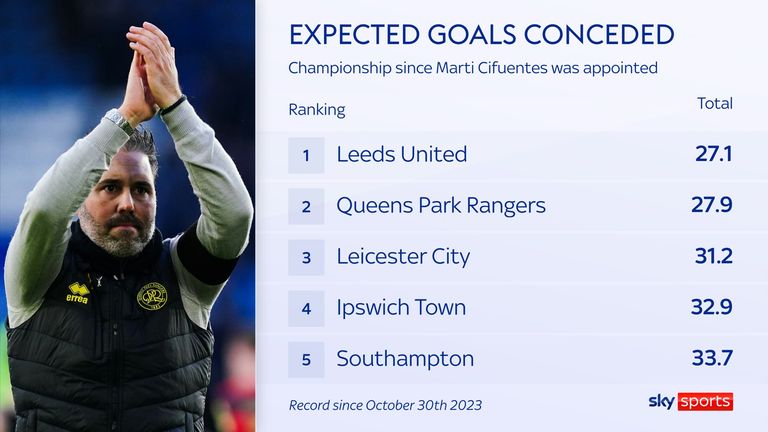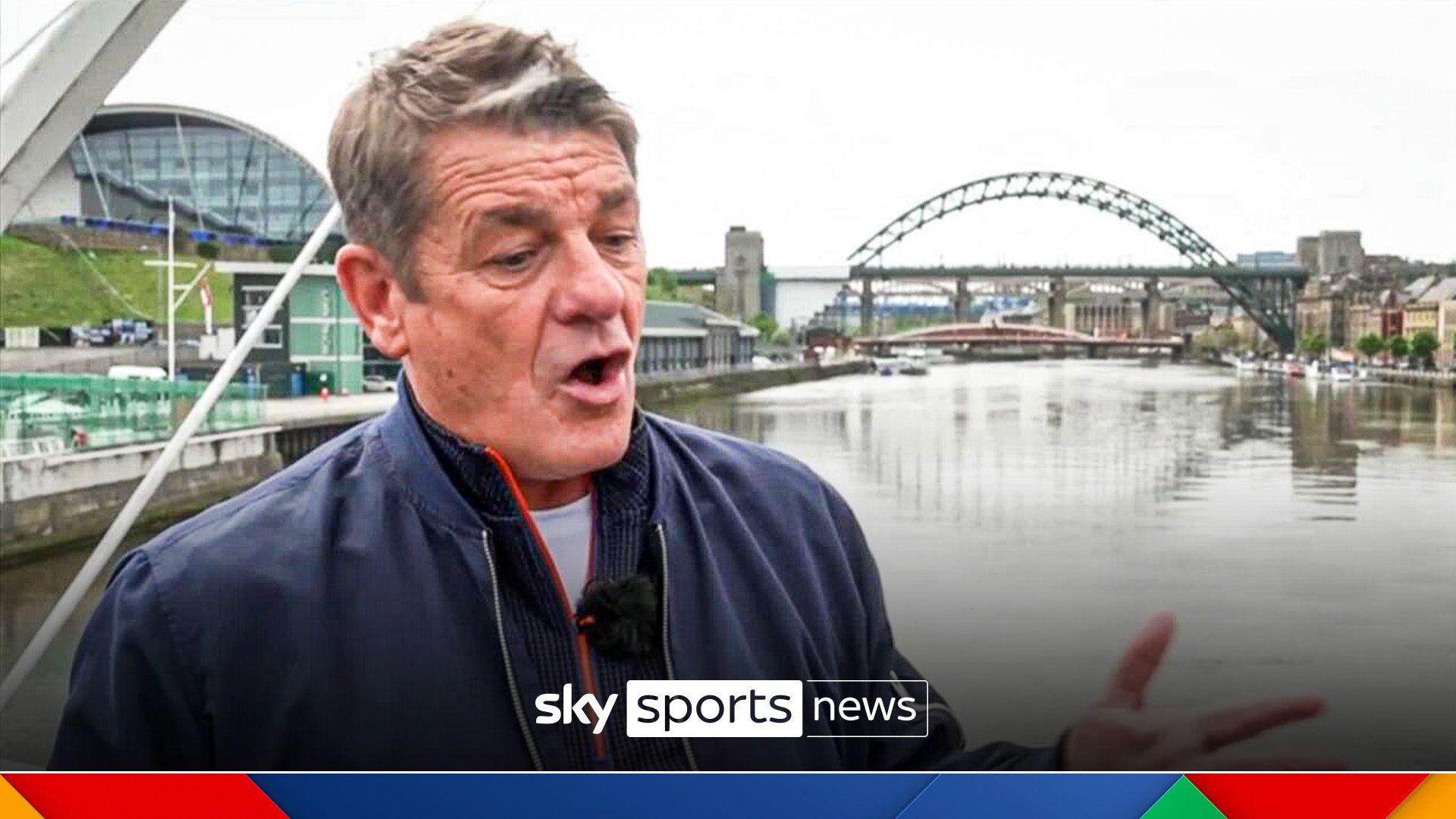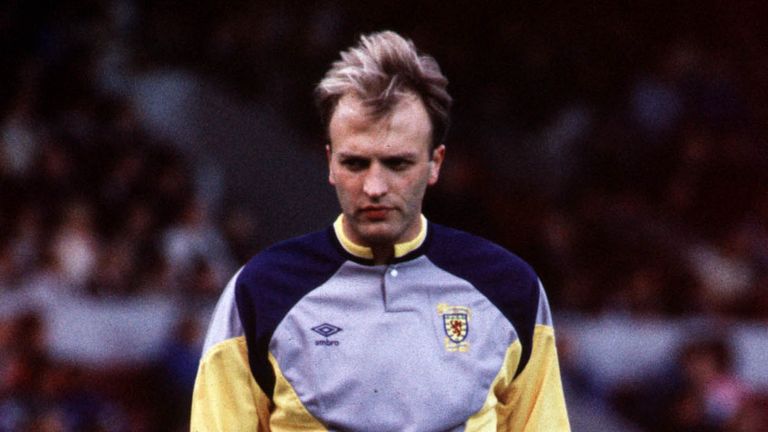When Marti Cifuentes arrived at Queens Park Rangers in late October, the club was one place off the bottom of the Championship. Morale was low. It was asking a lot for a relatively unknown coach to turn it around and keep them in the division.
That is exactly what he did, QPR eventually finishing outside of the bottom six. In fact, only two teams in the Championship picked up more points from mid-January onwards. One of those was Leeds, spanked 4-0 at Loftus Road on a memorable night in late April.
Cifuentes, a 41-year-old Spanish coach who had spent the past five seasons honing his craft in Scandinavia, achieved this playing a brand of football more in tune with what QPR supporters expect of their side, lifting the gloom that had descended on the club.
No wonder that he has been linked with Premier League jobs.
“It means people value what you are doing,” Cifuentes tells Sky Sports. “But this was a team effort. I am very focused on QPR and excited about the future.” He is speaking from back home on the Girona coast, near Barcelona. “A needed break, I would say.”
As he reflects on a whirlwind year, it is acknowledged that even those close to Cifuentes saw this move as a risk as well as an opportunity. Had he been unable to have such a big impact, the next chance in England would probably never have come his way.
“I never think much about what if.” He saw only possibilities. “I think the fact that I had faced situations like this before helped. We knew that it was a very challenging situation upon my arrival. But I was convinced that it was possible. That was my mindset.”
QPR had endured a miserable start but problems ran deeper. “We realised that it was not only about the beginning of this season. Unfortunately, it was 12 to 16 months of a not very positive trend that QPR was in. To reverse that is all credit to the players.”
How did they do it? The starting point was to implement a new playing style. QPR’s possession statistics were among the very lowest in the Championship, the team struggling under predecessor Gareth Ainsworth. Cifuentes managed to change that.
He encouraged players low on confidence to believe that more was possible. “I always felt that when we grew up playing football, we wanted to have the ball at our feet not to be going around chasing it. That principle of being proactive should never change.”
He explains: “We wanted to create that spark, to get the player thinking about why they wanted to play football. We tried to trigger this from the first session. I wanted to see players laughing and enjoying themselves, while working hard. I think we achieved that.”
“It was a fresh start for everyone. I wanted to make sure we had an identity as a team that was connected to the club. I knew that QPR had this history with a lot of technical players, attacking football. That was very aligned with my way of thinking.
“We wanted the players to forget a little bit about where in the table we were. To give them a new way of thinking because they were the ones who were suffering from being in a relegation battle for a long time. That can be draining from a mental point of view.”
Easy to say but harder to do. And yet, players responded, showing they were capable of more. “Players such as Ilias Chair and Chris Willock were more suited to playing in a team that tries to attack, that tries to have the ball on the ground,” says Cifuentes.
“Players such as Jake Clarke-Salter, Jack Colback and Sam Field could develop into that kind of football. One of the things that made me most proud is that we could see the progress as we developed into a team that we could recognise more and more.”
Training was transformed with a huge focus on positioning. “It is key. If you get two seconds of space rather than one because of your position, that will help you to execute better because you have twice the time that you would have with the wrong position.”
Interestingly, the consequences of this in-possession work was that QPR’s defensive record improved dramatically. According to the expected-goals data, they have had the second-best defence in the Championship since Cifuentes was appointed.
It was not achieved through dogged resistance. It was all linked to that more ambitious approach. “Of course, we work a lot on pressing and on how we defend the box, but a big part is the way we attack and then what we do very quickly when we lose the ball.”
Cifuentes even has a name for that. “It is a concept called zero-second reaction, that for us is very key. The moment we lose the ball, there is no regret, no complaints. We just try to regain the ball very quickly and as high up the pitch as we can,” he explains.
“If you ask our players how we turned our defence into a strength, it was by working on how we attack. Only one time did we conceded three goals. Only one time did we lose by more than two goals. The identity was getting more and more into the players.”
Not that it was all straightforward. “We won three in a row and it looked like it would work quickly. The reality of the league is that it was not that easy. The lowest moment was against Millwall on Boxing Day. That made everyone realise we had to push harder.”
But Millwall were beaten 2-0 at Loftus Road in the rematch just weeks later and QPR have gone from strength to strength ever since. “It clicked.” The win over Leeds was an obvious highlight but it is one of many for Cifuentes. He smiles at the memories.
“It was the connection that we built with the fans. When we were playing away, at Leicester we had thousands supporting us. Plymouth on a Wednesday night, it was incredible. We created that feel-good factor with the supporters. It was a weapon.”
Particular favourites include a stoppage-time win over Birmingham. “Jimmy Dunne’s volley, a fantastic strike to win a six-pointer.” And a poignant draw at home to West Brom. “It was a special night for us in Stan Bowles’ memory. It was a turning point.”
That Cifuentes himself brings up Bowles, the fan favourite of the 1970s who passed away in February, is an indication that he has fully embraced the club’s past. With help from a club ambassador, he has even been having history lessons about the Hoops.
“Andy Sinton is an important figure to help me understand what this club means to people, the ups and downs. This has affected the way that I see our football. It is about the players we have now but it has to be connected with the way that this club is.”
Cifuentes has restored that feeling at QPR. Such is the nature of football, supporters will now be hoping for more, looking at that impressive form from the first half of 2024 and wondering whether it can continue and a return to the Premier League is possible.
Cifuentes is reluctant to get carried away. “We need to be very humble. There are a lot of good managers out there, a lot of clubs with more money than us. I think it would be naïve for us to expect that just because we have a good trend, it is going to work.”
But pre-season will help. “That is important.” And whatever happens, almost regardless of results, there is a sense that QPR are back. “We will lose games. That is football. But I always want the supporters to go home proud of what we were trying to do.”
Pride restored, then. So, what does all this mean to him? “A lot, and not just because it was difficult, but because of how we did it. That is why I am so happy. The togetherness with the fans has been something incredible. Hopefully, we can keep enjoying it.”



